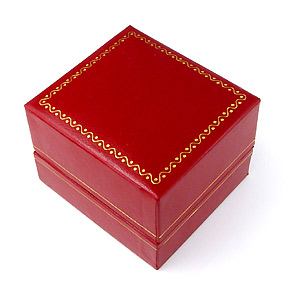
ALBERT'S VICTORY.
LAST Christmas Albert Reade's grandfather sent him a savings bank. It was painted a bright red, and was really a very pretty present. Albert had never had one before, and thought he had never seen one anywhere near as nice as his. He was very proud of his "bank," and at once began to think about getting some pennies to put into it; for who ever heard of a bank without money? Every penny that was given him by his friends now went into his bank instead of being spent for candy or fishhooks, as he had been in the habit of doing.
His father and mother, seeing how anxious he was, often gave him a chance to earn a little by hiring him to do jobs of work besides the chores which commonly fell to his lot. Then, too, when spring came, neighbor Brown, who had no boys of his own, wanted some one to bring up his cows at night, and so Albert drove them up when he did his father's cows; and for this he got ten cents a week. This seemed a good deal to a boy like Albert, who has always lived in the country, and so has not had so much spending money as city boys do. And every cent went into the bright bank; and week by week it grew heavier, and Albert's heart grew happy in thinking how rich he was getting.
Now just back of Mr. Reade's farm lies a pretty little lake, and two or three summers ago a party of young men and boys from the city camped there. They brought their tents and boats with them; and they often gave Albert and his brothers a ride. Since then it has been Albert's greatest ambition to have a pretty sail-boat like one of theirs. So when his bank began to fill up, he thought within himself, "Now I will save my money till I can get a boat." But when the boys questioned him about what he was going to do with his money, he gave no answer, only that they should see by and-by.
And so the summer passed away, and September came. One evening Albert's father came home from the post office, and as the family gathered around the supper table, he said, "I hear bad news tonight.
They say down at the burg that the woods in northern Michigan are afire, and everything is burning up.
Here is the paper telling all about it, in my coat pocket."
All were eager to hear the news; and as soon as supper was over, Mr. Reade handed the paper to Albert's older brother, Walter, saying, "Here, boy, your eyes are better than mine; can't you read for us?"
And so Walter read of the terrible fire and the ruin it was working,- how that houses, barns, and crops, and even whole villages were burned; and men, women, and children, with cattle and horses, fled before the fire, until the cruel flames overtook and destroyed them, leaving nothing behind but desolate fields and blackened corpses. Others ran until they came to lakes or rivers, where they stayed in the water for many hours. Sometimes the water along the shore grew so hot from the fire that the people were almost scalded.
Those who escaped from the fire had no home to go to, and nothing left but the tattered clothes upon their backs; and of course everybody would be glad to send money, provisions, and clothes to the poor sufferers.
After the reading was finished, all began to talk about what they could do to help; and even grandma and little Robbie were anxious to do their part. Money was never very plenty in the little brown house where Albert lives, and it seemed as if it was unusually scarce this fall; but Mr. Reade said to his wife, "Well, mother, we'll divide with them, won't we? We've never come to want yet, and I guess we shall not now." So while they were planning what should be done, the boys crept off to bed.
Albert had said nothing, but all the while his father and mother were talking, he had someway been thinking about his bank and the money in it.
Me wondered how much there was, anyway; but then he could not think of sending that off, for he must save it toward getting that boat which he so much wanted.
Finally Albert dropped to sleep, but the first thing in the morning he thought of the poor people, and then his bank. He went about his chores with such a sober face that his mother asked him if he was sick, for Albert was usually a very cheerful boy. After awhile he came into the house, and going into the little parlor, got his bank off the mantel, and crept softly up stairs to his room under the roof. He sat down there with his head in his hands and his bank on his knees for a long time; and then getting up, he marched down stairs very fast, as if afraid his courage would fail him. His mother was at work in the kitchen, and he went up to her, and handing her the bank, said, "Here, mother, send this to them," and turned away without another word.
The mother saw what a struggle it was for her little boy, but she thought it was a good thing for him to learn to deny himself for others, and so she wisely said nothing. That evening Mr. Reade opened the bank, and counted out five dollars and sixty cents, Albert's donation to the fire sufferers.
The father said nothing, but something that looked like tears glistened in his eyes; and as Albert went to bid grandma goodnight, she put her hand on his head, and said softly, "God bless you, my son."
B. B.